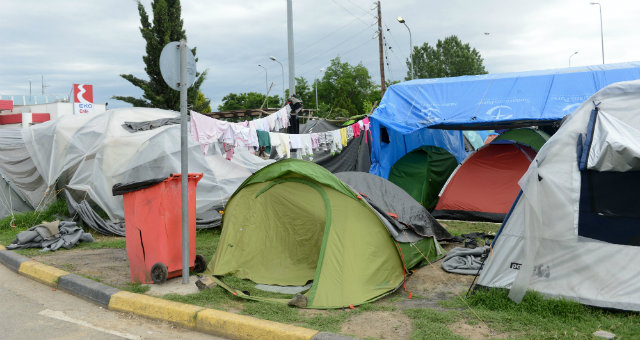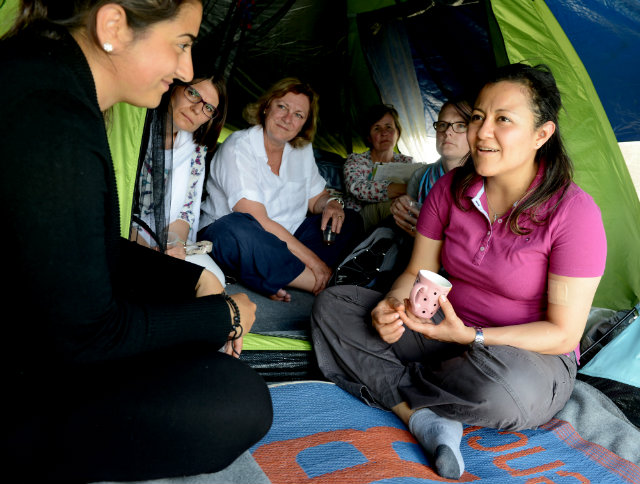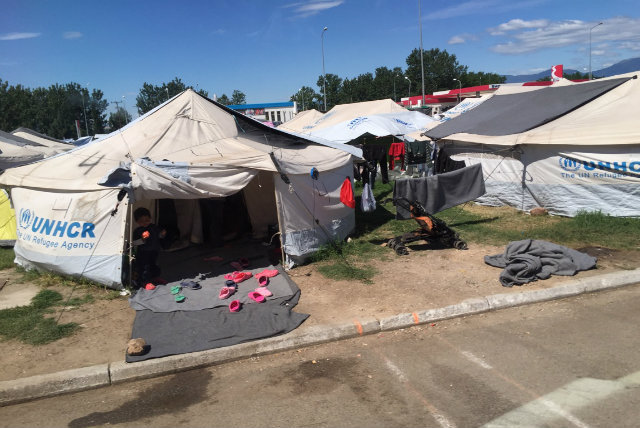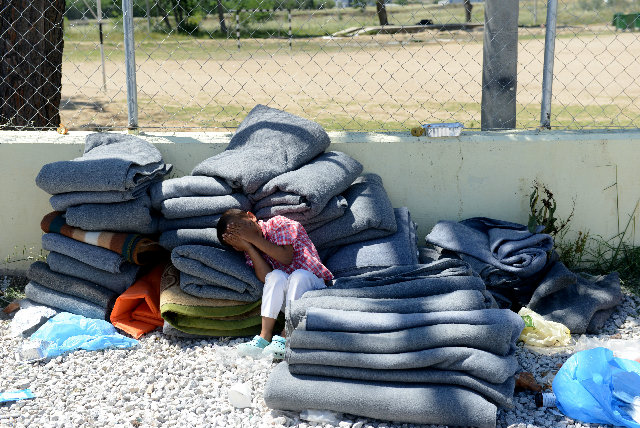Clare visits Greece
Between 23 and 27 May 2016 Clare and other women Christian leaders from CTBI visited refugee hotspots in Greece. They saw and heard first-hand testimony of the conditions in the camps and of support projects from refugees and aid workers. Here are some of Clare's reflections on the visit.
Who do you say I am?
 Last week I was welcomed into someone’s home. It was immaculately clean, tidy and soft underfoot, the shade providing a welcome relief from the blistering heat of the sunshine outside. I was offered coffee which was freshly brewed while we talked. We spoke of running a hairdressing business, of homes, cars and a daughter at university. We spoke of aspirations for the future for us and particularly for our children.
Last week I was welcomed into someone’s home. It was immaculately clean, tidy and soft underfoot, the shade providing a welcome relief from the blistering heat of the sunshine outside. I was offered coffee which was freshly brewed while we talked. We spoke of running a hairdressing business, of homes, cars and a daughter at university. We spoke of aspirations for the future for us and particularly for our children.
All of this may not sound in the least bit unusual. But the home I was welcomed into was a tent pitched on the edge of a makeshift camp in the grounds of a petrol station, known as “The Gas Station” just a mile or so up the road from Idomeni and the border between Greece and Macedonia. The coffee I drank was brewed over a calor gas stove and served in tiny plastic cups. The hairdressing business was no more, the building in Aleppo, Syria razed to the ground in a bombing raid. The home had been left in a hurry and the car had been sold to pay smugglers for the passage through Turkey to Greece. The daughter at university had had her degree in Persian Literature interrupted and aspirations for the future consisted of the hope that the border would reopen so they could join their daughter’s husband in Germany.
As we sat cross legged and listened to Fatima and Waheed’s story the words of Jesus to Peter came to the fore, “Who do you say I am?” And these words stayed with me for the whole of our time in Greece. From desperate people shoving identity documents through security fences at us hoping we would be able to somehow reunite them with their families elsewhere in Europe to people following us down the road and asking us to write their names down and to remember them, Jesus’ question “Who do you say I am?” rang out.
Because the refugee crisis, as we call it, goes right to the heart of who we are as human beings. Human beings made in the image of God. Peter’s answer to Jesus was clear. You are the Christ. When the people we met, living as refugees in desperate circumstances, ask us who do we say they are, the answer too is clear. They are Christ, Christ incarnate living among us. Christ who is both the host welcoming and breaking break but also the guest coming to us in need and asking for bread. And we are called to respond likewise as both the host, finding room in our hearts for those who come to us as refugees, but also as the guest receiving of their stories and coffee and of what they teach us of who we are, our identity. For we are all one in Christ.
Wanderings in the Wilderness or the Promised Land?
We all know the Exodus story. The story of the Israelites’ captivity as enslaved peoples in Egypt and their harsh treatment by the authorities at the time. We know of their miraculous escape led by Moses through the waters of the Red Sea and of their wanderings in the wilderness for 40 years. 40 years of being on the move. 40 years of hoping for the promised land. 40 years of boring subsistence food and having to live alongside one another with all the tensions that entails.

But do we know the Exodus story? Do we really know the Exodus story? Because it is being re-enacted right here and right across Europe, on our doorstep and in our own communities. For another mass Exodus is taking place with people fleeing the violence and terror of war-torn countries such as Syria, Iran, Iraq and Afghanistan. They have left everything, homes, livelihoods, gardens, cars, education to flee in the hope of finding safety, finding refuge, a new place to live.
And like the Israelites were led across the Red Sea, many of the refugees have faced huge dangers travelling first through Turkey and then across the Aegean Sea to reach Greece. Many have lost family and loved ones along the way either to the perils of the sea or in being separated from one another. But many have survived and made it across en-route to northern Europe and the hope of being reunited with husbands, sons and fathers in Germany, Sweden …
…Only to be left stranded in the wilderness, stranded in Greece as the borders have been closed. With little hope that the borders will open and an administrative system that simply can’t cope. But like the Israelites in the wilderness, life goes on. Some are living in make shift camps. Many more have registered for re-location or reunification with family and now live in official Government refugee camps behind fences and coils of razor wire. And conditions are bad, beyond what most of us could imagine as bad and certainly wouldn’t want to experience.
But just as the Israelites must have encountered groups of people living in the wilderness, may even have had help from them, so too the Greek people are finding themselves playing host to a huge number of unexpected guests. And they are rising to the challenge in terms of volunteering with NGOs (Non Governmental Agencies) and churches, in donating food and clothing and money and in taking families into their homes. And what started out as helping people on their journey through Greece to elsewhere in Europe has become supporting people who are stranded longer term.
The promised land of reaching family elsewhere in Europe or seeking asylum in a new country in Northern Europe seems far off as day to day life is hard to maintain. Some we heard, want to go back. “In Syria we may die”, we were told, “but here we are dead”. Sound familiar?
Only we have been brought up to celebrate the Exodus story as God’s great work in liberating people and bringing them into a new life as God’s covenant community. Maybe we too need to celebrate and welcome this new Exodus story as God liberating people from war and terror and bringing them into a new life, to a new community. Only that community is ours. Ours and the EU’s.
Or maybe it is a little bit more complicated that that. I always did feel for the Canaanites in the Exodus story. The ones whose land was occupied and taken over by the Israelites as their promised land. It is quite a threat to your own identity and sense of community when new people arrive. One or two can be accommodated but if the new people arrive in great numbers it means our own community and sense of identity need to change and that can be hard.
Although we do know that despite the Bible’s rhetoric about claiming the new land as theirs and destroying the Canaanites the reality was a far more mixed picture. A mixed picture of different communities coexisting and needing to learn to live alongside one another with all the tensions that entails.
And so we are left with a both / and kind of response. A need to celebrate this new Exodus as people being liberated or liberating themselves from violence and oppression. As many of the Greek people told us, the refugees have been a blessing. A blessing in that they have distracted people from their own troubles of the failing Greek economy and enabled people and churches to come together to respond in both a humanitarian way and also in a human, person to person way.
But we also need to begin to change our own identity, our own understanding of who we are. Europe is changing and changing fast. And will continue to change as long as people flee violence and oppression and seek a promised land. We need to become communities that welcome others, that can make space for different cultures and languages and faiths and that is a huge challenge when we know our communities can have many of their own problems. It means sharing out the resources and each of us having a bit less. But you know, in doing so, we might just gain, might just receive a blessing of encountering another, a blessing from God.
Because until we do, the Israelites are left wandering in the wilderness and tens of thousands of refugees are left trapped in Greece. For only we, the public can petition Governments and the EU to change policy. And only we, the public can make our communities places of welcome and hospitality.
I wonder what would have happened in the Biblical story if the Israelites had never reached the promised land? If they were left still wandering in the wilderness…